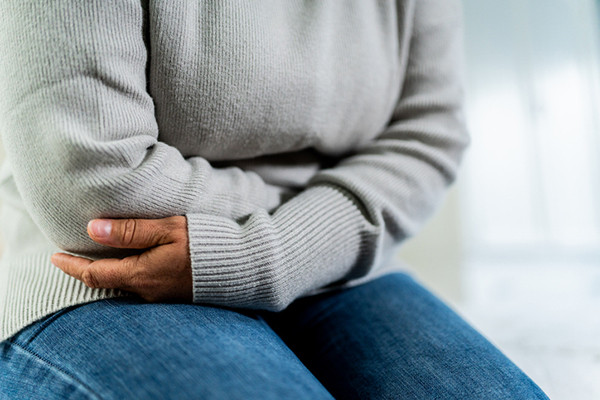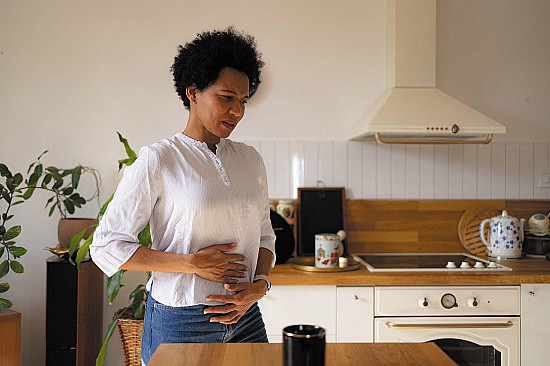How to get rid of bloating: Tips for relief
- Reviewed by Howard E. LeWine, MD, Chief Medical Editor, Harvard Health Publishing; Editorial Advisory Board Member, Harvard Health Publishing

Why am I so bloated? Chances are, you've thought this at some point. Bloating is very common: nearly one in seven Americans reported experiencing it over the course of a week, according to a 2023 study published in the journal Clinical Gastroenterology and Hepatology.
That tight, full feeling of bloating can be uncomfortable. And it's often accompanied by distension, in which the abdomen swells in size. The good news is there's a lot you can do with lifestyle, including diet and exercise, to relieve symptoms.
Understanding bloating: Causes and triggers
Bloating results when too much gas builds up in the abdomen. Here's a quick look at some of the most common reasons for excess gas buildup and bloating.
Swallowing too much air. You swallow air every time you eat or drink. But if you consume food or fluid very quickly, you may gulp down extra air every time you swallow.
Certain foods. Fruits, veggies, whole grains, and beans are all good for you, but they are harder for your gastrointestinal (GI) tract to digest. Vegetables like cabbage, Brussels sprouts, and broccoli, for example, all contain the carbohydrate raffinose. Your body can't break this substance down until it reaches your colon, where the bacteria who devour it release gas.
Food intolerance. Some people are lactose intolerant, which means they have trouble digesting the milk sugar lactose. As a result, they may notice bloating after they eat or drink dairy products. Others have fructose intolerance, which means they develop GI symptoms after they eat foods high in fructose, a sugar naturally found in fruits and honey as well as table sugar (sucrose) and high-fructose corn syrup.
A slowing system. As you get older, your digestive system tends to slow down. This can cause gas to build up in your GI tract and trigger bloating.
SIBO. Some people have too many bacteria in their small intestine, a condition known as small intestinal bacterial overgrowth (SIBO). SIBO can lead to an imbalance of bacteria that support digestion, leading to symptoms like bloating as well as constipation and diarrhea.
Irritable bowel syndrome (IBS). Bloating is a common symptoms of IBS, a condition characterized by chronic belly pain and altered bowel habits.
Most people get bloated occasionally. But if it happens a lot, or if you have other symptoms like stomach pain, unexplained weight loss, or bloody stools, see your doctor. They'll want to check for a more serious condition like inflammatory bowel disease or even colon cancer.
Dietary changes to reduce bloating
The following dietary tweaks can help to reduce bloating.
Keep a diary. For a few weeks, note what you ate, when you ate, and when you felt especially bloated. This may help you and your doctor identify foods that are problematic.
Remove or decrease quantities of key culprits. Some of the top offenders for bloating include:
- carbonated beverages like soda and beer
- dairy products: you can switch to lactose-free milks (Lactaid, others) or plant-based milks like almond milk instead
- sugar-free gum and candies — they contain artificial sweeteners that can cause bloating
- beans
- fruits high in fructose such as apples, apricots, bananas, peaches, pears, and dried fruit
- cruciferous vegetables like broccoli, Brussels sprouts, cabbage, and cauliflower.
Consider a low-FODMAP diet. If the above steps don't help, you may want to consider this eating pattern, which avoids certain types of carbohydrates that are hard to digest. Since this diet can be very restrictive, it's best to do it under the guidance of a nutritionist.
Mindful eating practices to prevent bloating
If you gobble down your meals, you may find that you're bloated afterwards. When you eat fast, you swallow air. You may also overeat. Both contribute to bloating.
One way to help prevent this is to practice mindful eating. That means you focus on your food rather than your phone, TV, or another distraction. Some ways to eat mindfully include:
- Eat with chopsticks, or with your non-dominant hand (so if you're a righty, eat with your left hand).
- Chew your food 30 times per bite.
- Eat in a screen-free zone — that means no smartphone, computer, or TV.
- Plate your food rather than eating it straight from a container or serving dish.
- Eat sitting down.
- Make your meal last at least 20 minutes.
Physical activities to keep bloating at bay
Staying active is good for your brain, heart, and even your gut. According to a 2023 review published in the Journal of Rehabilitation Medicine, exercise — whether it's walking, running, biking, swimming, or doing yoga — appears to help relieve symptoms of irritable bowel syndrome, which include bloating. It may also help relieve stress, which has also been linked to worsening of bloating.
If you can't fit in a regular workout, at least try to take a stroll after meals. People who took a 10-to-15-minute walk after they ate reported less bloating, according to a 2021 study.
Home remedies for bloating relief
There are a lot of products out there claiming to cure bloating. While there's no magic way to instantly relieve gas, here are a few things you can try at home.
Cook with anise. This herb has also been shown to reduce bloating in people with IBS and dyspepsia.
Try over-the-counter medications. The most popular one is simethicone, found in products like Gas-X or Maalox Anti-Gas. Simethicone helps to break up gas bubbles. Other products, like CharcoCaps, contain activated charcoal. These products may help with occasional bloating, but there's no good evidence any work.
Consider alpha-d-galactosidase. Also known as Beano, this over-the-counter product helps to break down certain difficult-to-digest carbohydrates found in beans and some vegetables.
About the Author

Hallie Levine, Health Writer
About the Reviewer

Howard E. LeWine, MD, Chief Medical Editor, Harvard Health Publishing; Editorial Advisory Board Member, Harvard Health Publishing
Disclaimer:
As a service to our readers, Harvard Health Publishing provides access to our library of archived content. Please note the date of last review or update on all articles.
No content on this site, regardless of date, should ever be used as a substitute for direct medical advice from your doctor or other qualified clinician.















